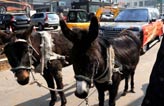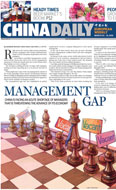Art
Hui opera's future in mist
Updated: 2011-03-11 10:35
By Xie Fang (Chinaculture.org)
 |
Far-reaching effects
Hui Opera has had a major influence on Peking Opera. This form of regional opera laid the base on which Peking Opera developed. Beijing residents were not introduced to Hui Opera until 1790. Kunqu had been the dominant form of musical entertainment among the Beijing elite since the Ming dynasty (1368-1662). Characterized by convoluted narratives and poetic language, most Kunqu pieces, like the famous Peony Pavilion, were written by and circulated among the intelligentsia. Kunqu, which was regarded as elegant, quickly gained official recognition in the Qing dynasty (1644-1911) because the foreign sovereignty was eager to identify itself with Confucian culture in order to legitimize its rule. Most other opera styles, including Hui Opera, were condemned.
In 1790, the emperor Qianlong (reigned 1736-1795), a great opera fan, invited many of the most famous regional opera troupes around the country to Beijing to celebrate his eightieth birthday. And among them was the Hui Opera troupe Sanqing. Sanqing stayed on in the city after the event and performed for people in the city. Beijingers, including the emperor himself, fell for the new theatrical form immediately, and Hui Opera started to assimilate with other operas to become Peking Opera.
Seeing the extreme popularity of the Hui Opera, the Qing government worried that its licentious or superstitious elements would corrupt its officials and citizens, and it passed various laws in the eighteenth and early nineteenth centuries banning certain opera styles and works. But the actual effects of this legislation were minimal.
Hui Opera soon replaced Kunqu and dominated Beijing’s cultural scenes. The Qing emperors were such Hui Opera fans that they built the finest theaters, invested lavishly in stage settings, and invited the most talented performers to perform at court. Their performances were so widely loved by the townspeople of the capital that in every theatre Huizhou Opera was put on, and in every performance a Huizhou Troupe took a major part. After that, Cheng Changgeng helped develop Huizhou Opera into Peking Opera by combining it with Han, Kun and other operas. So Huizhou Opera in a sense is an ancestor of Peking Opera.
In addition, Hui Opera has had a historical connection with 10 other local operas both in the southern and northern parts of China with an influence reaching all over the country, Yunnan Opera, Cantonese Opera, Fujian Opera and Hunan Opera to be mentioned.
In 1790, Tan Cui, a member of Hui opera troope, held an office in Yunnan. He invited seven Hui Opera troupes to perform in Yunnan. It turned to be a huge success. The seven troupes stayed and influenced Yunnan opera greatly.
 |
During Emperor Qianlong’s reign, Hui Opera troupes went down to perform in China’s southern Guangzhou city. Later, they tried to sing in local dialect. Thus Cantonese Opera was born.
 |
During Qing Dynasty, many officials found it difficult to understand Fujian Opera, which originated in China’s southern Fujian Province. They invited Hui Opera troupes to Fujian. After the Revolution of 1911 which overthrew the Qing Dynasty, these troupes broke down and most of the actors joined Fujian Opera troupes, improving the local opera gradually.
 |
For quite a long time, Anhui businessmen were in charge of the business in China’s central Hunan Province. They provided much support for Hui Opera troupes, setting up platforms and advocating Hui Opera. Hunan Opera was founded by Hui Opera combined with local high tunes.
 |
To sum up, Hui Opera has played a significant role in the course of the development of Chinese operas, which carried on the past and opened a new way for the future. Nowadays, the lack of funds and talents is severely blocking the development of Hui Opera. We should spare no effort to inherit and protect the intangible Culture Heritage - Hui Opera.
E-paper

Rise and shine
The Chinese solar energy industry is heating up following recent setbacks in the nuclear sector
Preview of the coming issue
Bombs aim for regime change
CSI, with a twist
Specials

Donkey-powered Land Rover
Two donkeys pull a broken-down Land Rover in Shenyang, Liaoning province.

China Fashion Week
Models present creations for the Hosa Swimwear Trend Press Conference 2011.

Peony express
Growers of china's unofficial national flower are reaching out to europe for help
